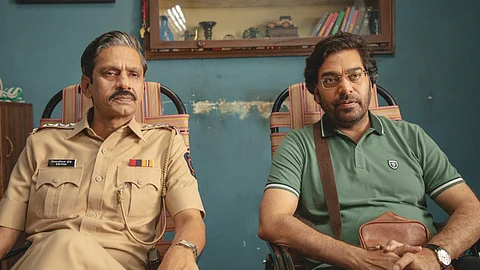
- HOMEGROWN WORLD
- #HGCREATORS
- #HGEXPLORE
- #HGVOICES
- #HGSHOP
- CAREERS
- ABOUT US
- CONTACT US

A gem of a TV series, Murder in Mahim, based on Jerry Pinto’s eponymous novel, was released on Jio Cinema on the 10th of May. Directed by Raj Acharya, the series stays true to the overarching theme of the book, which is centered on the gory murder of a gay sex worker in a public toilet at Mumbai's Mahim railway station. The narrative fuses traditional elements of a crime thriller along with broaching sensitive social issues such as homophobia and the perception of non-heteronormative individuals in mainstream society. The series features a stellar cast including Ashutosh Rana, Vijay Raaz, and Shivani Raghuvanshi.
In a candid interview with Homegrown, Pinto revealed that the literary decision to situate all the action in Mahim was based on the fact that he lives there. As a result, he could portray the place with unmatched authenticity, which the series does justice to, as well. Mahim is also one of the oldest settlements in Mumbai and that lends an interesting historical context. Throughout the series, we are taken through the underbelly of Mahim — the labyrinthine lanes, the gay clubs, and the queer parties, as we charter through the course of the investigation.
Whenever a story is adapted from the pages of a book and onto a screen, whether in the form of a film or a television series, it begs the question of how much material is lost in this process of translation or transference. More often than not, most readers complain that a particular adaption has not been able to do justice to the book, which is the original source material. Murder in Mahim, Pinto’s 2017 novel is a gripping fast-paced page-turner and quite naturally, there have been comparisons between it and the adaptation.
"Whenever we talk of transference or translation, we tend to always think of what is lost. But I’m more curious to see what has been gained in the series. The joy of making a series like this is unparalleled because of the collective creativity of the hivemind that comes into play — there is the writer, the director, the DOP, the set designer, actors, sound and costume designers all coming together with their creativity. The results are bound to be very different from what I wrote by myself several years ago. It's time we learn to celebrate what is gained in translation, rather than what is lost".
Jerry Pinto, in an interview with Homegrown
However, one of the major things that the series preserves from the book is the distinct identities of the characters. The pluralistic perspectives of the characters are captured nuancedly every time the camera shifts. The show adequately highlights how the members of the LGBTQIA+ community find themselves helpless in the face of rampant homophobia in society and even from the police, who are supposed to uphold the rights of every citizen.
This real-life depiction is meant to drive home the point of creating a society where love and vulnerability are celebrated and at the end of the day, we are all human beings who are struggling to make ourselves understood irrespective of our differences in class, caste, sexuality, religion or gender. However, the show goes beyond the marginalization of the queer community and also portrays the complexities of a father-son relationship.
Overall, this slow-burn television series deserves the viewer's patience and attention as it builds up to a showdown of a climax. Even though the series deals with serious social issues under grim circumstances, it comes off as accessible without being too preachy.
If you enjoyed reading this article, here's more from Homegrown:
Rima Das' 'Tora's Husband' Lays Bare The Hard-Hitting Reality Of Post-Pandemic Life
Ishan Shukla's Debut Film Imagines A Dystopian World Through Psychedelic Animation
'Piano Fingers' Unpacks The Emotional Weight Of Living With Huntington's Disease
